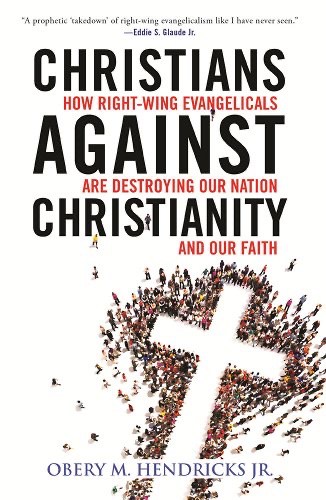Title: Christians Against Christianity: How Right-wing Evangelicals are Destroying Our Nation and Our Faith
Author: Obery M. Henricks, Jr.
Publisher: Boston, MA: Beacon Press
Pages: 232
Reviewer: Carolyn Custis James
When principles that run against your deepest convictions begin to win the day, then battle is your calling, and peace has become sin; you must, at the price of dearest peace, lay your convictions bare before friend and enemy, with all the fire of your faith.
—Rachael Denhollander, quoting Abraham Kuyper
Obery M. Hendricks Jr.’s new book, Christians Against Christianity: How Right-wing Evangelicals are Destroying Our Nation and Our Faith is “packin’ heat!”
Recent research indicates that the white American evangelical church is hemorrhaging. The Public Religion Research Institute released a report in July 2021 indicating that white evangelical Christians are “declining…significantly.” In 2006 white evangelicals represented 23% of the U.S population, but in 2021 white evangelicals now represent only 14.5 %, according to the PRRI data.
What was once a mere trickle of silenced and wounded evangelicals slipping away unnoticed has become a full-fledged exodus. Something is happening, and Hendricks is offering his analysis. Younger evangelicals are leaving the church to search for Jesus and to ask what it means to follow him as citizens of the Kingdom of God.
Recent events have had a jarring effect on evangelicalism. After the Access Hollywood tape went public, a line-up of well-known evangelical leaders doubled down on their public endorsements of a defiant Trump and urged the rest of us to follow their lead, insisting that he was the “moral choice.” That was when a young friend of mine, who’d been an evangelical her whole life, declared, “That’s when they lost me.”
That was before the January 6 insurrection at the U.S. Capitol, with protesters proudly waving Jesus flags. These tumultuous events have given evangelicals pause: Is this the Christianity of Jesus?
It is a big mistake if evangelical leaders simply focus on stopping the bleeding and fail to explore root causes that are driving so many away. Hendricks is persuaded that that the day of reckoning for white American evangelicalism is upon us.
Hendricks is calling white evangelicals to a gospel of hope, justice, and compassion. He believes the gospel itself is in jeopardy.
Today American evangelicalism is known more for right-wing politics than for embodying a gospel that requires followers “to do justice, and to love kindness, and to walk humbly with your God” (Micah 6:8). Hendricks is calling white evangelicals to a gospel of hope, justice, and compassion. He believes the gospel itself is in jeopardy.
For those who truly believe in the Gospel of Jesus Christ, in its call for a world of justice, love, and inclusion for all, it is time to set the record straight.
As a highly respected African-American biblical scholar (with a Ph.D. in Religion from Princeton University), Professor Hendricks isn’t the least bit shy about raising controversial issues or timid in his assessment of the damage these issues are doing to Jesus and His gospel. He doesn’t mince words or coddle readers. Issues he highlights reach deeply into how Jesus’ gospel, teaching, and example impact every arena of life. The pastoral conversation he initiates is exactly what evangelicals departing the church and those who love them need and are longing to engage.
He has done significant research, and his work exhibits a fair-mindedness. He has strong convictions both as a Christian, a scholar, and as an African American. But he also has a generous capacity to acknowledge pros and cons of both sides of an issue, which underscores the complexity of the topics he raises.
Unlike other recent critiques of evangelicalism, the main focus of the book is not racial injustice or Black Lives Matter. Instead, he centers on larger justice issues, growing evangelical fears, and controversy surrounding social justice. Outspoken evangelical leaders like John MacArthur portray social justice as a deadly threat to Jesus’ gospel. Hendricks is quick to point out that,
There are approximately three thousand verses in the Bible that are concerned with social justice and the common good, with taking care of the poor and the immigrant, with the indiscriminate extension of kindness and compassion.
His defense of social justice as an essential outcome of Jesus’ gospel is alone worth reading this book. His discussion of current political loyalties versus Jesus’ teaching should leave readers asking if politics shape our Christianity or if Christianity shapes our politics.
Central to Hendricks’ analysis of these complex issues are the words of Jesus in Matthew 22, “to love God with all our heart, soul, strength, and mind, and to love our neighbor as yourself.” The twin themes of love and responsibility, drawn directly from the teachings of Jesus, dominate the message of this book and shape Hendricks’ conclusions.
Admittedly some readers will find this book challenging. I certainly did. It is both challenging and often unsettling because these are tough issues that push us out of our comfort zones. Hendricks doesn’t allow us to default to simplistic conclusions, where we decide a remote but emphatic “yes” or “no” to complicated issues without facing and grasping their complexities and the realities and suffering they inflict on real lives.
In the midst of this confusing time, Christians Against Christianity brings a bracing prophetic voice of clarity—a call to return to first things, and above all to wrestle boldly to ensure that Jesus shapes our Christianity, our politics, and our interaction with the wider culture and world.


